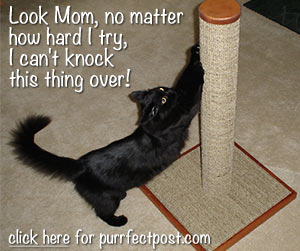5 Ways to Tell If Your Cat Is Stressed (and Tips for What to Do)

Does your cat have too much stress? If you don't know the answer, don't feel bad. Cats often try to hide their anxiety, much like they try to hide signs of illness and injury. You'll have to be a bit of a detective to know if your cat is experiencing stress. Here are some things to watch for.
Eliminating Outside of the Litter Box
Cats that are stressed often wish to mark their territory; it helps them feel better and more secure. If your cat suddenly begins eliminating outside of the litter box, it might be because of stress.
Of course, other things can cause inappropriate elimination in cats, like litter box location aversion, a box that isn't kept clean enough, or a medical problem. If your cat suddenly begins eliminating outside of the box, have him checked out by a veterinarian; consider stress as a cause after medical conditions and litter box issues have been ruled out.
Over-Grooming
A stressed-out cat might begin excessively licking at certain areas of his body. Often, the belly and legs take the brunt of such stress grooming. You might also notice extra hairball vomiting.
If your cat suddenly begins licking excessively at himself, visit the veterinarian right away to look for a medical problem. If none can be found, psychogenic alopecia might be the culprit. This condition is one in which a cat begins licking himself as a self-soothing mechanism due to stress, and it becomes an obsessive condition.
Sudden Inappropriate Scratching
Scratching is another behavior that cats use to mark territory, so a stressed cat might begin scratching inappropriate surfaces as a way to self-soothe. Stress scratching is especially prominent on vertical surfaces like furniture arms and walls.
Hiding
Cats that feel stressed might choose to hide. They feel more secure in a small area where they can't easily be seen or disturbed. Sick cats often hide more, too, so it's important to look for other signs of illness that might be happening concurrently, like decreased appetite and vomiting.
Aggression Toward Other Pets or Humans in the House
A cat that suddenly becomes aggressive toward the other cats, dogs, or even people in the household might be experiencing stress. Misplaced aggression is a common culprit for causing this behavior. In this situation, the indoor kitty might be feeling stressed because he can sense an outdoor cat that he can't get to, so he attacks his housemates instead. Sick or injured cats might suddenly become aggressive, too, so this is another sign that must be examined closely to determine the cause.
What to Do If You Suspect Your Cat Is Stressed
If you have been to the veterinarian to rule out medical causes of your cat's behaviors and you are left suspecting that your cat is stressed, here are some things you can do:
- Increase interactive play with your cat. Allowing your kitty to exercise his hunter instincts by playing with a wand toy or one that mimics rodent behavior can help him let off steam and feel calmer.
- Give your cat more scratching posts. Scratching helps your cat release stress, so provide good quality scratching posts in prominent areas of the home. Marking his territory this way, in high-traffic areas of the house, will help your cat feel better.
- Consider using Feliway. This product is made to mimic the pheromone that cats produce when they're feeling calm. When it is diffused or sprayed, cats often feel calmer.
- Be sure you have enough resources available. Cats become stressed when they feel that resources are scarce. This can become an issue, especially, in multi-cat households. Make sure you have enough food and water bowls, cat beds, scratching posts, and clean litter boxes, so your cats don't have to compete for them.
You May Also Like These Articles:
Why Do Cats Love Small Spaces?


